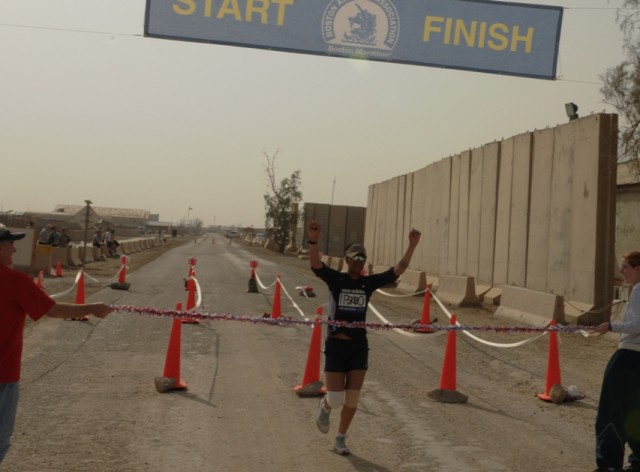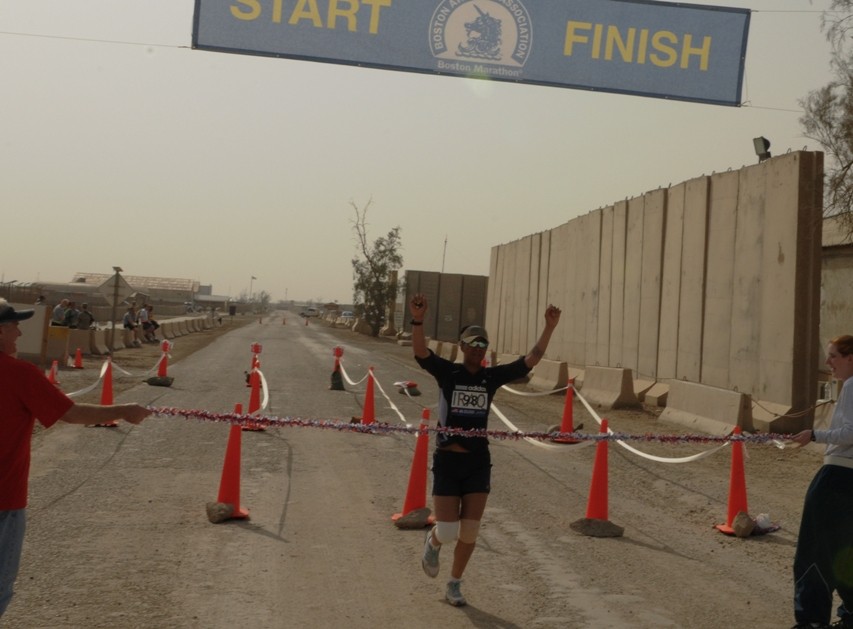CONTINGENCY OPERATING BASE ADDER, Iraq (April 20, 2010) -- Besting roughly 400 other civilian and military runners from all over Iraq, Sgt. Derek Miller won the sixth annual Boston Marathon here, April 18.
With a time of 3:01:00, Miller shared the laurels with Spc. Janelle A. Drennan, whose 3:40:09 made her the first female finisher.
Sanctioned by the 114-year-old race's sponsor, the Boston Athletic Association, runners completing the 26.2-mile course qualify to run in the namesake race in Boston, said the COB Adder marathon organizer, Command Sgt. Maj. Lauro F. Obeada, command sergeant major of the 4th Special Troops Battalion, 4th Brigade Combat Team, 1st Armored Division.
Obeada said that in addition to their certificates, all runners finishing receive the same blue-and-yellow-enameled pewter medallions presented to runners in Boston, as well as the official BAA Boston Marathon long-sleeve tee-shirt and lapel pin.
Like the namesake race and its iconic hills in Massachusetts, the race at COB Adder has its own unique challenges. Among these challenges are the uneven surface of some of the roads and the wind, which can vary from brief gusts to full-blown sandstorms, such as the vicious storm that postponed the race the previous day.
To avoid the brunt of the Iraqi sun, the race began at 4:30 a.m.
The early start sent racers onto a dark course, illuminated by streetlights and guided by chemical light sticks set out to make sure runners did not take the wrong turn. All along the route, there were water points, medic stations and portable toilets staffed by dozens of volunteers.
When Miller and the others began to come in, just past 7:30 a.m., the temperature was already in the 80s.
"I was pacing at a 6:30-mile until I hit the wall at mile 18, after that it was just survival," said Miller, a native of Hersey, Pa., who is assigned to Obeada's personal security detachment.
Miller said that after the fifth mile, he was part of a two-man leader-pack with second-place finisher, Francis Yiga.
Yiga, who finished at 3:16:00, is a Ugandan security guard at the COB.
"Running together, we took turns drafting each other from the wind," he said.
At the 18-mile mark, Yiga, a former Uganda marathon champion, also had trouble and stopped at the water point.
"I looked for him, I saw he was 100 meters back," Miller said.
As he hobbled from the finish line to the medic station set up inside COB Adder's Memorial Hall, Yiga said he stopped because he tweaked a thigh muscle and had to walk it off before he could jog the last eight miles.
"The most important thing is to complete the course," he said. Miller said when he saw Yiga had pulled up, he took advantage.
"If you fall behind at mile 18, you don't have it in your legs to pick it back up again. You have to save your move for when you feel you are the strongest," Miller said. "I just told myself: 'Don't panic. Just keep this pace-he doesn't have the legs to keep up with you.'"
Running is a mental struggle more than a physical one, said Drennan, an intelligence analyst with the 201st Battlefield Surveillance Brigade, who battled sore knees during the race.
The Denver native and a track star at Eaglecrest High School in Aurora, Colo., said because this was her first marathon after competing in 10 half-marathons, her first mental struggle came at mile 13.
"I kept hearing the voice of my father, who was also my track coach telling me: 'Keep going. Keep fighting.'"
Drannan said her first call would be to her father, who was waiting to hear how she did.
Although the race was promoted throughout U.S. Forces Iraq, the number of runners was restricted to 400, said Spc. Stevan H. Gonzalez, a Texas National Guardsman from San Juan, Texas.
Gonzalez, who handled the day-to-day preparations for the race, said the last slot was filled April 15 by an e-mail registration at 3:37 p.m.
Despite the 400-runner cap, Gonzalez said he told last-minute applicants to show up at the race anyway, and there was a good chance there would be enough no-shows to give the walk-ups a slot. After the race, he confirmed that everyone who wanted to race was given an official number and allowed to compete.
Two of the last applicants were identical twin brothers deployed to Iraq with the Virginia National Guard, Spc. Soloman Zemene, #399, and Spc. Eskinder Zemene, #398.
"We got here two weeks ago and when I saw the poster for the marathon, I told my brother we should do it," said Solomon, whose 3:36:56 time beat his brother's 4:00:07 time.
"He always beats me. I think he is just tougher. He keeps going when I feel like quitting," said Eskinder, who, like his brother, is a resident of Alexandria, Va., and a student at Northern Virginia Community College.
As the Zemene twins look forward to other races in Iraq, Miller said he is slated to fly home with other Soldiers from his battalion before the end of the month, and he is already looking to his next goal.
"I ran in Boston in 2004, but I dropped out with cramps at mile five. I will absolutely be there next year."
(Sgt. Neil W. McCabe serves with 4th BCT, 1st Armored Division PAO.)


Social Sharing